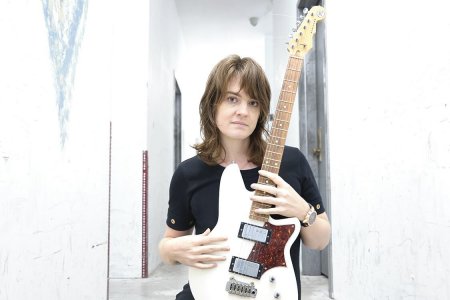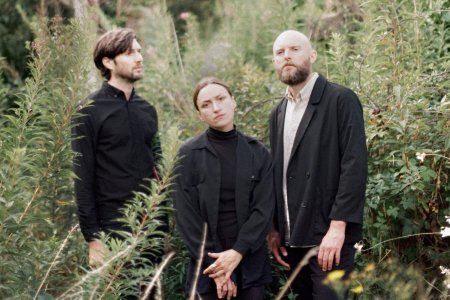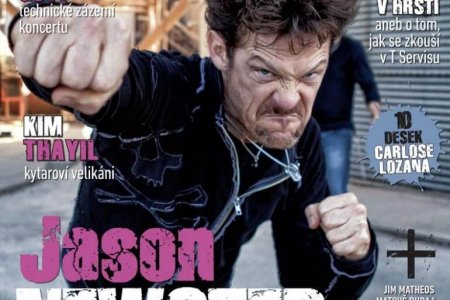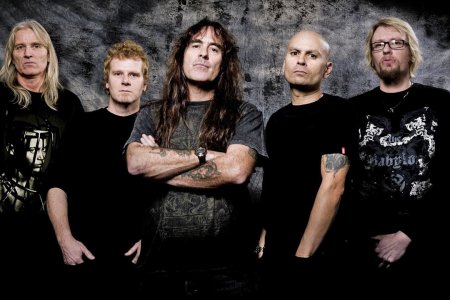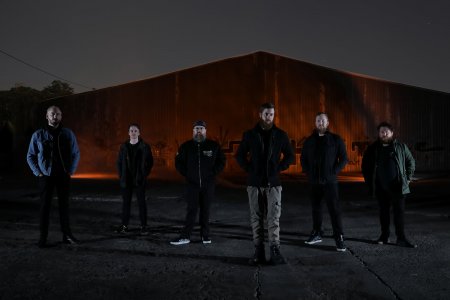Canadian band BadBadNotGood carries a jazz tag in the long term, but that was never quite adequate. More precisely, it was never enough for them. All members studied jazz, but partly as a rebellion towards their teachers, they acquired even bigger motivation to conquer the world with pushing the boundaries of the genre and ignore conservative listeners. At first, they often played as a support band for hip hop icons either live or in a studio. Over time the talks about their genre portfolio or even the music origin of their partners became irrelevant. They were collecting compliments continuously, especially around their IV album from 2016, but on their latest release Talk Memory you can feel even higher maturity, taste and perspective. I am grateful that band’s saxophone player Leland Whitty, which can handle also a number of other instruments, accepted an invitation for the interview.
Interview took place in fall 2021 and came out in January 2022 issue of Czech magazine Full Moon.
One hour special about Leland’s career in Czech at Český rozhlas Jazz here and extensive Spotify playlist here.
Photos credit: Jamal Burger
How are you spending the end of the autumn?
We are going on a tour pretty soon. So I’ve just been practicing, getting ready and sorting out all the gear.
When does your tour start?
We’re starting on December 8th and for the following two weeks we’re gonna be traveling around Canada. That’ll be like the first tour from this record period. And then we’re gonna do the United States in March/April and then Europe in November/December next year. Then like, hopefully, I mean, that’s just we decided to kind of make it sort of light in the timing just because of you know, COVID things tend to change pretty rapidly. So hopefully more stuff gets tacked on to that, but yeah, it’s kind of exciting because it’s been two years since we played the show. Now we have this new record, we’re doing a bunch of new music and new live show. So yeah, kind of exciting times.
How is the situation in Canada right now? Do you think everything will happen according to a plan?
Actually, right now, it’s pretty good to be honest in Toronto. Same as everywhere in the world, there were lock downs, but since summer, everything has sort of been getting lifted. Our numbers are quite good, compared to other phases of the epidemic, but in order to have a successful tour, we need it to get even better. But it’s rough. I’m sorry to hear from my friends that they had to cancel events and tours, but it’s kind of nice to see here and also in the States that the vaccination rates are pretty high. Things seem to be opening and hopefully, it’s kind of the sign of finally actually getting out of this.
What about the pre-sales of the shows? Lately, I heard from my friends organizing events here in Prague that people are waiting for the last moment. Restrictions are changing very fast and an uncertainty pushes people to buy their tickets on the day of the show.
We’ve been pretty lucky in that regard. Because things were shut down for such a long time, I feel there’s this energy of everyone wanting to go to a different types of events. Our shows were among the first things to be happening in Canada and I feel people are just eager to get out and hear some music.
Practical Minimalism
In what period were you writing the album?
We kind of did the whole album in a relatively short period of time, but we had been writing all throughout 2019. But all the music that’s actually on the record was written in November/December of 2019 and then we recorded it all in early 2020. We recorded in Los Angeles at Chester’s. But the pandemic was hitting and starting to get really serious, as we were there, so we decided to fly home early. But luckily, we were able to finish all of our musical parts together and we did a sort of email collaboration with our guests online. So that’s how we got Arthur Verocai or Brandee Younger involved. In a perfect world, it would have been nice to do everything together. But it’s an amazing alternative to reach out to these people that we are huge fans of and see if they’re up for collaborating.
I heard the same words recently from Ringo Starr who said, it’s weird because the pandemic enabled him to reach out to some really cool people available for cooperation, as they are not touring. Was it the same case with you?
Yeah, everyone had some sort of their home studio figured out and we’re kind of like, eager to work as much as possible. Did you interview Ringo Starr?
I was invited for a press conference regarding his latest EP. This was my last interview for magazine Muzikus, which ended its activities after thirty years. I worked there for more than a decade. One of the many victims of the pandemic. Did some of the frustrations and challenging experiences get reflected on the album?
Sorry to hear that about the mag. I don’t think the pandemic really affected the musical side of things, as the majority was done beforehand. But it did impact me and the guys in a way that for the first time we couldn’t be there in person when the record was mixed. It was the first time that we weren’t able to be there in person for that. But luckily we had Russell Elevado, who is an absolute legend. We trust him and it was pretty easy to go back and forth about our vision with him. But yeah, especially all the visual aspects were super reflected by the pandemic. With all the music videos that were being put out, even that idea to do a music video for every song was directly inspired by the fact that we thought we wouldn’t be able to play. We wanted to engage more people in a visual way of how all those videos are created. And we were actually able to be involved in the shoot for maybe three of them. With the rest we were kind of like reaching out to the directors and letting them work in their own realm. So yeah, the whole isolation thing, and like, trying to make something creative. Through Zoom, it’s just not really the way I think any art should be created. But luckily we live in the same city. So we were able to work on a ton of music and keep that side of things rolling full time.
When you were talking about a fact that you influenced just a couple of videos, was the one including skateboarding, one of them? I think I saw one Instagram story of yours skateboarding.
Yeah. I grew up skateboarding and over time I kind of got back into it. Next to seeing my friends, it was simply a nice way to get outside. But at the same time, I’m getting older now. So I can feel it when I fall down. But the video was done to kind of show the casual aspect of what skateboarding is all about. Just getting together with your friends and hanging out. There are some really amazing tricks in the video, but it wasn’t really supposed to be about that. A little homage to like, kind of growing up and everything. I think there’s so many integrated things with skateboarding culture in the music world now. You know stuff that I wouldn’t have when I was a teenager. You know, clothes or different rap music or whatever. I’m getting into it through that. So yeah, it’s kind of just cool.

We were just trying to find out whatever made the most sense to convey the essence of the song in its broadest form.
As you were talking about the fact that you could hang out with the whole band even during a pandemic, give us please a clearer idea about the writing, as the chemistry seems great. Compared to older records, you started to write longer tracks. I feel there a big motivation for minimalism, but at the same time, you let each other do solos in a very supportive manner.
Yeah, in the past, absolutely, everything was always written together. And that’s kind of the case for this record as well. Well, for the majority of it, as there are a few songs, which were written individually like Beside April or Timid, Intimidating. Chester did them on his own and brought them to us to learn and play. Talk Meaning was the one I wrote. Even though they’re written individually, we always spent a lot of time just kind of like taking whatever their composition is and trying to mess with it in different ways to make it the most authentic to who we are as musicians. But then I guess the majority of the music was written just by jamming, improvising and latching on to specific ideas that started to come out and trying to flush them out into full songs.
If we look at the whole spectrum of instruments, where were you in that position? Somebody wrote a song and said: “Bro, I just feel I want you to do a guitar, bass or a saxophone here.” How were you splitting the roles, mainly with Chester?
For this record we used to have four members, but Matthew Tavares quit the band at the start of 2019. Even though we had a lot of guests involved, there was just the three of us for the most part. I think when we were recording, we were just trying to find out whatever made the most sense to convey the essence of the song in its broadest form. I’m not really a bass player. But the reason why I ended up playing bass on the record was because Chester is an amazing piano player. So, Open Channels and City of Mirrors are songs that he kind of came up with the piano parts and was doing a lot of improvising on those songs. It made sense for me to play bass but Chester’s a million times better bass player than I am. Beyond just trying to make group decisions, I have been playing guitar for a really long time. But I guess this record was the first time that it’s more a showcase. And we’ve been listening to and reconnecting with a lot of rock music that I listened to when I was a teenager like Black Sabbath, Mahavishnu Orchestra, Jimi Hendrix, or whatever. Timeless music. So that was the best inspiration to get back on. Thanks to this quality, I started to hear what instruments would fit well and tried to approach it that way. But I guess it started at random to a certain extent, just trying to have a sonic variety. Even though I do play a lot of instruments, every change motivated me creatively, whether it was a saxophone or a bass.
For the track called Talk Meaning you brought Brandee Younger. When did you come up with an idea to have a harp in that song?
This song carries in itself the essence of the works of John and Alice Coltrane. It’s built on this hypnotic mood, where a harp fits really well. You simple don’t get that combination from a piano or guitar. Her take was actually the last thing that was recorded for the record, but yeah, it just kind of brings this calm beauty out of like this really chaotic track.
We can say the same about the video, which includes a lot of children’s fantasies. Were you creatively involved?
That video was one of the ones that we were not really involved with. Danica Kleinknecht came up with the whole concept, but it’s always hard to fully imagine what it’s going to turn out to be. We were a bit worried, but it turned out great. She did an amazing job. All the actors were amazing, plus they dressed them perfectly. I also love their fortress and technology they play with, as well as the subtle touch of animation towards the end of the song as well.
Atmospherical Upgrade
Compared to previous albums, on Talk Memory, you included a lot of strings. What inspired you to start a cooperation with Brazilian composer Arthur Verocai?
His music is such a huge inspiration to of us as a group and we had a chance to play a show with him, when we opened for him in Somalia. He had this whole orchestra with him, but for the last four songs he invited to join him in playing. It was like one of the biggest highlights, performance-wise for us, and it just kind of like established the connection. When we were wrapping up this record, we were kind of hearing different string arrangements. We started to add them ourselves, but it wasn’t ideal, so we thought to reach out to him. Because of the pandemic, we thought: “He’s probably just chilling at home and writing arrangements anyways, so why not to try to reach him out?” He was super into it and added us into his busy schedule. When we heard the audio files he sent back, we were all completely blown away. It’s such a unique sound. A lot of the music that he arranged for us is vocal based music. So it really fits to our instrumental music. It provides so much melodic content that it almost changed all what the songs were.
When we are talking about moving the core idea somewhere else, I remember just a few days ago, I saw the interpretation of the Signal From The Noise by Joe Armon-Jones. How does it feel when such a respected musician invests so much energy into your own work?
It’s incredible. We’ve gotten asked a lot in the past to provide sheet music for our songs. With this album, the interest was even bigger, so we transcribed all the music. We sent them to a bunch of people before they actually heard the song. So in the case of the version by Joe Armon-Jones, he learned the song from the sheet music before actually hearing our version of it. It’s like super cool, because it’s like another layer variable and it’s really incredible. That’s of the aspect of pandemic which proves music is something that should be experienced together. It’s nice to have this connection to other artists that are interpreting our music. Because it brings us together in a way that I mean, wouldn’t have happened otherwise.

In a perfect world, it would have been nice to do everything together. But it’s an amazing alternative to reach out to these people that we are huge fans of and see if they’re up for collaborating.
Very unique experience was probably working with saxophone player Terrace Martin, who is currently very active with Robert Glasper in the project called R+R=Now.
I met Terrace Martin on one European festival, where he played with R+R=Now. Their show back then was one of my best concert experiences ever. When we returned to Los Angeles, we tried to contact him, if he would like to play on our album and he agreed. I admire him a lot, including all of his production activities. I honestly recommend his latest album Drones. The track called Talk Meaning is very raw, production-wise. But all of those years on the tour showed us how we can transfer all of these discoveries to studio. I am talking mainly about song structure, where guests can easily join. Terrace even promised that he will join us, if we will meet each other on the festival. In the studio, it was very cool. We decided to use very simple setting of the microphones. We even shared one with Terrace. (Laugh) It isn’t very traditional jay composition. It includes a number of solos. Sometimes we even play one over another. Terrace Martin is one of my idols and I was very happy that we recorded our interaction.
Terrace Martin has many activities and therefore I would like to know, how he is on the personal level. I recently saw a live footage, where he plays with Robert Glasper, Christian Scott and many other. He looked like that he needed to use something to relax. Sometimes he was in his own zone, but everybody around was very supportive.
He is very busy, but his dedication i on the maximum level. It was easy to communicate with him. We both love saxophone player Jackie McLean. While recording, we found a bunch of many other common favorites. He is a great musician and therefore he has a right to be self-confident. When he enters a room, you can clearly see he is able to cooperate one day with Kendrick Lamar and Herbie Hancock on the second day. He didn’t smoke with us, but anytime I saw him at some event with R+R=NOW out of the stage, I don’t doubt that he relaxed properly with his friends. (Laugh) I personally cannot do it and I don’t dare to play if front of people, when I am high. I want to be just with myself.

